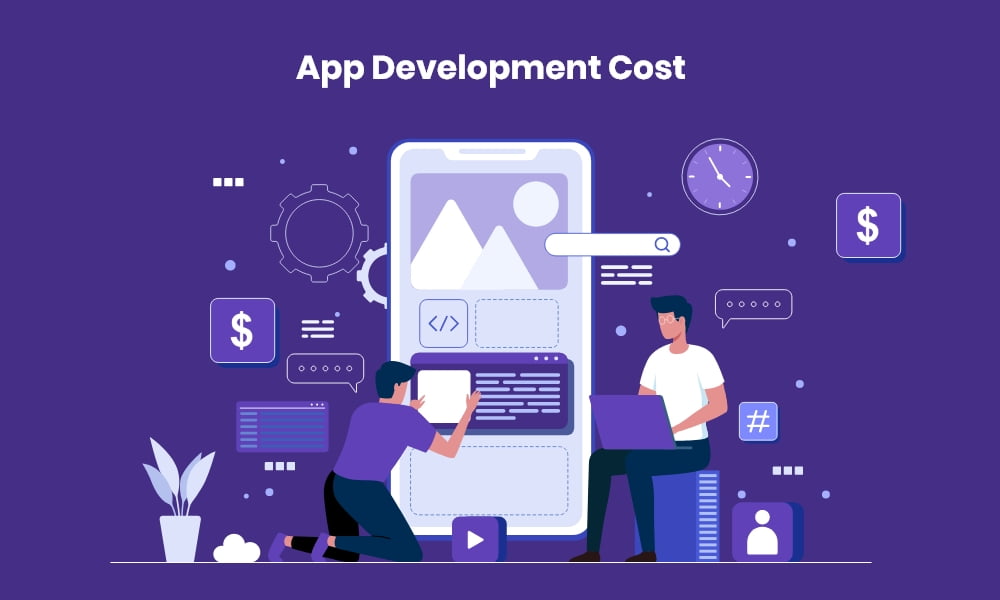Understanding the complexities of mobile app development costs is critical for businesses wanting to produce robust applications in the dynamic world of mobile app development. As technology advances, so do the complications that influence the financial landscape of app development. From platform selection to building complexities, this work provides insights into how many aspects affect mobile app development costs. By delving into these factors, we uncover strategies to help businesses make informed decisions, optimize costs, and create successful applications.
I. Understanding the Cost of Developing Mobile Apps
1. Platform and Operating System
Let’s delve deeper into the realm of development costs to understand how your platform choices align with the complexity of your project and impact its financial aspects.
Traditional Platforms
-
- iOS Platform
Development for the iOS platform typically costs between $20,000 and $100,000, depending on the app’s complexity. This investment ensures a tailored and optimized experience for iOS users.
-
- Android Platform
Creating an app for the Android platform falls within a similar cost range of $20,000 to $100,000. This choice allows you to cater to the extensive Android user base with a platform-specific approach.
Other Platforms
-
- Cross-Platform Development
Opting for cross-platform development allows you to reach users on both major platforms iOS & Android. Considering the development intricacies in ensuring compatibility across different operating systems, this approach may cost you anywhere from $20,000 to $100,000.
-
- Hybrid Apps
Hybrid apps combine elements of native and web applications, offering a balance between performance and versatility. The cost of developing hybrid apps can range from $20,000 to $100,000, reflecting the efforts needed to optimize the app for Android and iOS platforms.
-
- Progressive Web Apps (PWAs)
PWAs provide a cost-effective solution by offering cross-platform compatibility through web browsers. The average cost for developing PWAs falls between $10,000 and $50,000, showcasing the correlation between development complexities and cost considerations in c.atering to various devices and platforms.

2. Complexity
When exploring the complexity domain, we’ll look at many levels of complication, each of which influences the usual prices and expected timetables for app construction. This topic bridges the gap between platform selection and the nuances of development, providing a thorough grasp of the elements influencing the cost of developing a mobile app.
| Complexity | Description | Cost | Timeline |
|---|---|---|---|
| Simple app development | A simple app has basic features like login, user profile, dashboard, and limited administration. | $8,000 – 70,000 | 2 – 3 months |
| Medium-complexity app development | A medium-complexity app has more sophisticated features and custom UI details, such as payment integration, social media integration, chat functionality, etc. | $70,000 – 250,000 | 3 – 6 months |
| Complex app development | A complex app has advanced features and technologies like machine learning, augmented reality, blockchain, IoT, etc. | From $250,000 | 6+ months |
3. Cost Estimation Across App Features
When embarking on the mobile app development journey, understanding the various features and their associated costs and development times is crucial. Each component adds a layer of complexity that can impact your project timeline and budget. Look closely at critical features often shaping the development process and the resources required.
App Login & Sign-On
How users sign into your app can impact your development timeline. Here’s an estimate of the development hours required for different sign-in types.
| Sign-In Type | Cost (in USD) | Development Time |
|---|---|---|
| Social Login | $750 | 1-2 weeks |
| Email Login | $1000 | 1-2 weeks |
| Single Sign On | $3000 | 2-4 weeks |
In-App Features
The features you want in your app influence development time. Here’s a breakdown of the hours needed for various components.
| Feature | Cost (in USD) | Development Time |
|---|---|---|
| Events | $2500 | 3-6 weeks |
| Product Catalog | $5000 | 4-8 weeks |
| Map & Navigation | $2500 | 3-6 weeks |
| Forms | $375 | 1-2 weeks |
| Push Notifications | $250 | 1-2 weeks |
| Streaming Video/Audio | $625 | 2-4 weeks |
App Hardware Integrations
Integrating with hardware features is crucial for specific apps. Here’s a breakdown of the development hours required for standard hardware integrations.
| Feature | Cost (in USD) | Development Time |
|---|---|---|
| Camera | $500 | 2-4 weeks |
| Geofencing | $1000 | 3-6 weeks |
| Bluetooth | $750 | 2-4 weeks |
| Album Access | $375 – $750 | 1-2 weeks |
| Contacts Access | $375 – $750 | 1-2 weeks |
| Pedometer | $1000 | 3-6 weeks |
Looking to Outsource Development?
Contact TECHVIFY, Vietnam’s Leading Offshore Software Development & Outsourcing Company, for a consultation and development services.
4. Region
Understanding the expenses associated with various areas is critical for making informed decisions regarding custom app development costs. Different regions have multiple skill sets and price points, which can significantly impact your project’s final cost.
| Region | Hourly Rates | Key Characteristics |
|---|---|---|
| Vietnam | $10 – 50 | Affordability meets a range of expertise |
| India | $20 – 40 | Competitive rates with quality |
| Asia | $20 – 60 | Diverse options across skill levels |
| Eastern Europe | $30 – 70 | A balance between affordability and expertise |
| Western Europe | $60 – 150 | High quality with a higher price tag |
| United States | $80 – 170 | Premium expertise with higher costs |
| Australia | $80 – 200 | Skilled developers with an emphasis on quality |
5. Hidden Costs
Embarking on an app development journey comes with more than meets the eye. Beyond the apparent costs, several hidden expenses can significantly impact your project’s financial plan and timeline. Here are some essential hidden costs that deserve your attention.
-
- Ensuring Quality with Testing
Rigorous testing and ensuring quality are crucial for a successful app. However, the complexity of identifying and fixing bugs, addressing compatibility issues, and providing security can lead to unexpected hours and costs.
-
- Maintenance and the Long Run
Launching your app is just the beginning. Regular maintenance, updates, and bug fixes are necessary to keep users happy and the app running smoothly. Allocating resources for these ongoing activities is essential.
-
- Staying Current with Platform Updates
Mobile platforms like iOS and Android frequently release updates. Ensuring your app stays compatible with these updates demands ongoing development, which adds to your overall budget.
-
- Adhering to Legal and Compliance Standards
Depending on your app’s functions and user data handling, legal obligations and regulatory compliance might result in legal and consulting expenses. Ignoring these aspects could lead to costly legal issues.
-
- Investing in Security and Data Protection
Implementing robust security measures to safeguard user data and thwart potential cyber threats is paramount. However, prioritizing top-notch security could contribute to your initial development costs.
More Mobile App Development Articles:
II. Top 5 Ways to Reduce Your Mobile App Development Costs
Exploring the realm of mobile app development has the potential to be cost-effective. You can efficiently save costs while preserving the quality of your app with an intelligent strategy and analytical techniques. Below is a closer look at some main processes that can result in cost savings.

1. Prioritization of Strategic Features
Prioritize critical features that provide instant commercial value when building the basis of your app. Prioritize developing a Minimum Viable Product (MVP) to expedite launch and gain customer input for further updates.
2. Early Quality Assurance Participation
Reduce the likelihood of problems and glitches by enlisting Quality Assurance (QA) professionals from the beginning. Addressing concerns early in the development process eliminates significant interruptions and saves costs in the long run.
3. Future-Proof Preparation
Recognize that the trajectory of your app may change over time. Include flexibility in the architecture of your app to support feature updates depending on user feedback and market trends, avoiding the need for costly overhauls.
4. Strategic Development Team: In-House vs. Outsourcing
Select the best staffing model for your app development requirements. Outsourcing provides access to a talent pool while reducing office and equipment costs. To arrive at a well-informed choice, consider both the pros and cons.
5. Select Cross-Platform Development
Creating tailored apps for each platform can be costly. Utilize cross-platform development frameworks such as Flutter, Unity 3D, or React Native. This method allows companies to reach a larger audience without doubling their mobile app development costs.
Conclusion
Through app development’s intricacies, this article illuminated how platform choices and complexity levels shape costs. Hidden expenses underscore the actual financial landscape. Strategic prioritization, early quality assurance, future-proof planning, innovative team selection, and cross-platform approaches offer guidance to reduce costs. When stepping forward, armed with this knowledge, businesses are poised to create not just an app but a cost-effective masterpiece that resonates with the audience and stands the test of time.
Unlock your app’s potential with TECHVIFY‘s expert mobile app development services – let’s turn your business vision into a reality. With 300+ experienced experts, we promise to offer your companies the best services at affordable prices.
TECHVIFY – Global AI & Software Solution Company
From Startups to Industry Leaders: TECHVIFY prioritizes results, not just deliverables. Accelerate your time to market and see ROI early with high-performing teams, AI (including GenAI) Software Solutions, and ODC (Offshore Development Center) services.
- Email: [email protected]
- Phone: (+84)24.77762.666





